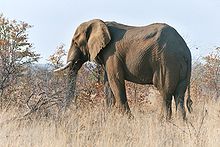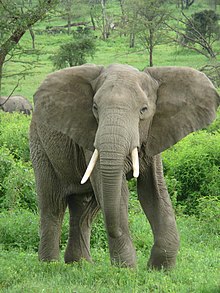слон
Belarusian

Alternative forms
Etymology
From Proto-Slavic *slonъ, possibly a deverbative from Proto-Slavic *sloniti sę (“to lean against”), relating to а medieval story of а sleeping elephant who leaned against a tree. According to some other sources, it is related to the Turkish arslan (“lion”).
Pronunciation
Noun
слон • (slon) m animal (genitive слана́, nominative plural сланы́, genitive plural слано́ў)
Declension
| singular | plural | |
|---|---|---|
| nominative | слон slon |
сланы́ slaný |
| genitive | слана́ slaná |
слано́ў slanóŭ |
| dative | слану́ slanú |
слана́м slanám |
| accusative | слана́ slaná |
слано́ў slanóŭ |
| instrumental | слано́м slanóm |
слана́мі slanámi |
| locative | слане́ slanjé |
слана́х slanáx |
| count form | — | сланы́1 slaný1 |
1Used with the numbers 2, 3, 4 and higher numbers after 20 ending in 2, 3, and 4.
See also
| Chess pieces in Belarusian · ша́хматныя фігу́ры (šáxmatnyja fihúry) (layout · text) | |||||
|---|---|---|---|---|---|
| каро́ль (karólʹ) | ферзь (fjerzʹ) | ладдзя́ (laddzjá) | слон (slon) | конь (konʹ) | пе́шка (pjéška) |
Bulgarian

Pronunciation
Etymology 1
From Proto-Slavic *slonъ, possibly a deverbative from Proto-Slavic *sloniti sę (“to lean against”), relating to а medieval story of а sleeping elephant who leaned against a tree. According to some other sources, it is related to the Turkish arslan (“lion”).
Noun
слон • (slon) m (feminine слони́ца)
- elephant (usually a male one)
- Synonym: (obsolete) фил (fil)
- като слон в стъкларски магазин (idiom) ― kato slon v stǎklarski magazin ― like a bull in a china shop (literally, “like an elephant in a chine shop”)
- от мухата прави слон (idiom) ― ot muhata pravi slon ― to make a mountain out of a molehill (literally, “to make an elephant out of a fly”)
Declension
Hyponyms
- евразийски слон (evrazijski slon, “gen. Elephas”) (literally: Eurasian elephant)
- африкански слон (afrikanski slon, “gen. Loxodonta”) (literally: African elephant)
- маму́т (mamút, “mammoth”)
Derived terms
- сло́нов (slónov)
References
- “слон”, in Речник на българския език (in Bulgarian), Sofia: Bulgarian Academy of Sciences, 2014
- “слон”, in Речник на българския език (in Bulgarian), Chitanka, 2010
- Nayden Gerov, Тодор Панчев (1904) “слонъ (2)”, in Рѣчникъ на Блъгарскꙑй язꙑкъ. Съ тлъкувание рѣчи-тꙑ на Блъгарскꙑ и на Русскꙑ.[2] (in Bulgarian), volume 5, Plovdiv: Дружествена печꙗтница "Съгласие.", page 193
- Todorov, T. A., Racheva, M., editors (2010), “слон²”, in Български етимологичен речник (in Bulgarian), volume 7 (слòво – теря̀свам), Sofia: Prof. Marin Drinov Pubg. House, →ISBN, page 113
Etymology 2
From Proto-Slavic *slonъ (“offset”).
Noun
Declension
This entry needs an inflection-table template.
Derived terms
References
- Nayden Gerov, Тодор Панчев (1904) “слонъ (1)”, in Рѣчникъ на Блъгарскꙑй язꙑкъ. Съ тлъкувание рѣчи-тꙑ на Блъгарскꙑ и на Русскꙑ.[3] (in Bulgarian), volume 5, Plovdiv: Дружествена печꙗтница "Съгласие.", page 193
- Todorov, T. A., Racheva, M., editors (2010), “слон¹”, in Български етимологичен речник (in Bulgarian), volume 7 (слòво – теря̀свам), Sofia: Prof. Marin Drinov Pubg. House, →ISBN, page 112
Macedonian
Etymology
Inherited from Proto-Slavic *slonъ, possibly a deverbative from Proto-Slavic *sloniti sę (“to lean against”), relating to а medieval story of а sleeping elephant who leaned against a tree. According to some other sources, it is related to the Turkish arslan (“lion”).
Pronunciation
Noun
слон • (slon) m (plural слонови, feminine слоница, relational adjective слонов, diminutive слонче, augmentative слониште)
Declension
Russian
Alternative forms
- слонъ (slon) — Pre-reform orthography (1918)
Etymology
Inherited from Proto-Slavic *slonъ, possibly a deverbative from Proto-Slavic *sloniti sę (“to lean against”), relating to а medieval story of а sleeping elephant who leaned against a tree. According to some other sources, it is related to the Turkish arslan (“lion”).[1][2]
Vovin (2011) proposes that Slavic slonъ reflects Old Chinese 象 (*ljaŋʔ /*slaŋ/, “elephant”), an etymology previously suggested by Ivanov (1977: 156–57) albeit with an incorrect Old Chinese reconstruction *sðaŋ. As Vovin notes, contact between Slavic and Old Chinese is out of the question, so the solution might arise from an intermediary source. Ivanov (1977:154) believes that the Chuvash forms слон (slon), сӑлан (sălan, “elephant”) are Russian loans, with the latter being called into question by Vovin on phonetic grounds. According to him, Russian /o/ (phonetically a diphthong [uo] with a mid-high syllabic element [o]) is unlikely to be borrowed as Chuvash low vowel /a/. The reverse, namely the borrowing of Bulgar slightly labialised /a/ as Slavic /o/ is more than likely. Chuvash сӑлан (sălan, “elephant”) is exactly the expected outcome of the Old Chinese *slaŋ with the insertion of ⟨ă⟩ breaking the OC initial cluster /sl-/ and typical Bulgar shift of Proto-Turkic *ŋ to /n/. The presence of this word in Chuvash places proto-Bulgar speakers in the vicinity of Northern China no later than first century BCE, because approximately after that date the initial clusters in Old Chinese underwent the process of simplification.[3]
Pronunciation
Noun
слон • (slon) m anim (genitive слона́, nominative plural слоны́, genitive plural слоно́в, feminine слони́ха, relational adjective слоно́вый or слоно́вий, diminutive сло́ник, augmentative слони́ще or слоня́ра)
- elephant
- (chess) bishop
- (colloquial, usually about children) one who walks loudly or heavily; stomper
Declension
Abbreviations
- (chess piece): С (S)
Synonyms
- (chess piece): офице́р (oficér) (informal)
Derived terms
- слонёнок m anim (slonjónok)
- слони́ха f anim (sloníxa)
- слоно́вник (slonóvnik)
- слонопота́м m anim (slonopotám)
- де́лать из му́хи слона́ (délatʹ iz múxi sloná)
- слон в посу́дной ла́вке m anim (slon v posúdnoj lávke)
- как слону́ дроби́на (kak slonú drobína)
Descendants
See also
- морско́й слон (morskój slon)
- СЛОН (SLON)
| Chess pieces in Russian · ша́хматные фигу́ры (šáxmatnyje figúry) (layout · text) | |||||
|---|---|---|---|---|---|
| коро́ль (korólʹ) | ферзь (ferzʹ) | ладья́ (ladʹjá) | слон (slon) | конь (konʹ) | пе́шка (péška) |
References
- ^ Vasmer 1955: 663.
- ^ Stachowski 2005: 447.
- ^ Vovin, Alexander (2011) First and second person singular pronouns: a pillar or a pillory of the ‘Altaic’ hypothesis?[1], pages 271–272
Serbo-Croatian
Etymology
Inherited from Proto-Slavic *slonъ, possibly a deverbative from Proto-Slavic *sloniti sę (“to lean against”), relating to а medieval story of а sleeping elephant who leaned against a tree. According to some other sources, it's related to the Turkish arslan (“lion”).
Pronunciation
Noun
сло̏н m (Latin spelling slȍn)
Declension
Further reading
- “слон”, in Hrvatski jezični portal (in Serbo-Croatian), 2006–2024
Ukrainian
Etymology
From Proto-Slavic *slonъ, possibly a deverbative from Proto-Slavic *sloniti sę (“to lean against”), relating to а medieval story of а sleeping elephant who leaned against a tree. According to some other sources, it's related to the Turkish arslan (“lion”).
Pronunciation
Noun
слон • (slon) m animal (genitive слона́, nominative plural слони́, genitive plural слоні́в, feminine слони́ха, relational adjective слоно́вий or слоня́чий, diminutive слоне́ня or слоня́)
Declension
| singular | plural | |
|---|---|---|
| nominative | слон slon |
слони́ sloný |
| genitive | слона́ sloná |
слоні́в slonív |
| dative | слоно́ві, слону́ slonóvi, slonú |
слона́м slonám |
| accusative | слона́ sloná |
слони́, слоні́в sloný, slonív |
| instrumental | слоно́м slonóm |
слона́ми slonámy |
| locative | слоно́ві, слоні́ slonóvi, sloní |
слона́х slonáx |
| vocative | сло́не slóne |
слони́ sloný |
See also
| Chess pieces in Ukrainian · шахові фігури (šaxovi fihury) (layout · text) | |||||
|---|---|---|---|---|---|
| король (korolʹ) | ферзь (ferzʹ) | тура (tura) | слон (slon) | кінь (kinʹ) | пішак (pišak) |
References
- Bilodid, I. K., editor (1970–1980), “слон”, in Словник української мови: в 11 т. (in Ukrainian), Kyiv: Naukova Dumka
- “слон”, in Горох – Словозміна [Horokh – Inflection] (in Ukrainian)
- Belarusian terms inherited from Proto-Slavic
- Belarusian terms derived from Proto-Slavic
- Belarusian terms with IPA pronunciation
- Belarusian terms with audio pronunciation
- Belarusian lemmas
- Belarusian nouns
- Belarusian masculine nouns
- Belarusian animal nouns
- be:Chess
- Belarusian hard masculine-form nouns
- Belarusian hard masculine-form accent-b nouns
- Belarusian nouns with accent pattern b
- be:Mammals
- Bulgarian terms with IPA pronunciation
- Bulgarian terms with audio pronunciation
- Rhymes:Bulgarian/ɔn
- Rhymes:Bulgarian/ɔn/1 syllable
- Bulgarian terms inherited from Proto-Slavic
- Bulgarian terms derived from Proto-Slavic
- Bulgarian lemmas
- Bulgarian nouns
- Bulgarian masculine nouns
- Bulgarian terms with usage examples
- bg:Elephants
- bg:Male animals
- Bulgarian dialectal terms
- Macedonian terms inherited from Proto-Slavic
- Macedonian terms derived from Proto-Slavic
- Macedonian 1-syllable words
- Macedonian terms with IPA pronunciation
- Macedonian oxytone terms
- Rhymes:Macedonian/ɔn
- Rhymes:Macedonian/ɔn/1 syllable
- Macedonian lemmas
- Macedonian nouns
- Macedonian masculine nouns
- Macedonian masculine nouns with plurals in -ови
- mk:Elephants
- Russian terms inherited from Proto-Slavic
- Russian terms derived from Proto-Slavic
- Russian terms derived from Old Chinese
- Russian terms derived from Bulgar
- Russian 1-syllable words
- Russian terms with IPA pronunciation
- Russian terms with audio pronunciation
- Russian lemmas
- Russian nouns
- Russian masculine nouns
- Russian animate nouns
- ru:Chess
- Russian colloquialisms
- Russian hard-stem masculine-form nouns
- Russian hard-stem masculine-form accent-b nouns
- Russian nouns with accent pattern b
- ru:Elephants
- Serbo-Croatian terms inherited from Proto-Slavic
- Serbo-Croatian terms derived from Proto-Slavic
- Serbo-Croatian terms with IPA pronunciation
- Serbo-Croatian lemmas
- Serbo-Croatian nouns
- Serbo-Croatian masculine nouns
- sh:Mammals
- Ukrainian terms inherited from Proto-Slavic
- Ukrainian terms derived from Proto-Slavic
- Ukrainian terms with IPA pronunciation
- Ukrainian terms with audio pronunciation
- Ukrainian lemmas
- Ukrainian nouns
- Ukrainian masculine nouns
- Ukrainian animal nouns
- uk:Chess
- Ukrainian hard masculine-form nouns
- Ukrainian hard masculine-form accent-b nouns
- Ukrainian nouns with accent pattern b
- uk:Elephants









